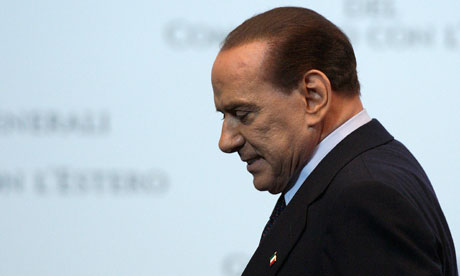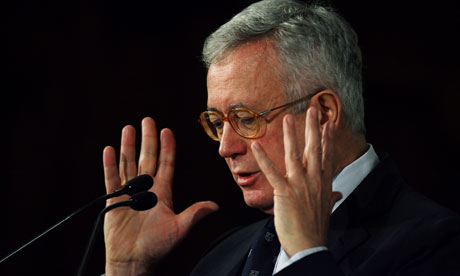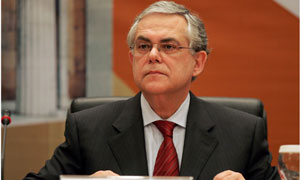
Italy's soaring borrowing costs have piled pressure on prime minister Silvio Berlusconi. Photograph: Reuters
Last night, while finance ministers from across the eurozone were meeting, their counterparts from European countries who haven't joined the euro had their own dinner.
David Gow has discovered that this group, which included George Osborne, are becoming a more unified group. The ten euro "outs" including the Brits, Danes and Swedes, are now demanding observer status at meetings of the 17 "ins". This could turn very nasty.More from David:
The Poles, who hold the EU presidency, will probably send a formal letter demanding this to Herman Van Rompuy, European council president, with a copy to Jean-Claude Juncker, eurogroup chairman. Van Rompuy may even be asked to chair talks among the "outs" if it ever gets formalised. The Czechs organised last night's meal, the Danes will host the next one.
Behind the scenes there's an awful lot of flak. José Manuel Barroso, commission president, has ratcheted up the debate by telling his fellow right-of-centre EPP colleagues: "not belonging to the euro is the deviation from the rule."
One colleague has therefore dubbed the "outs" the "deviants".
Barroso is, of course, a member of the unelected Frankfurt Group we blogged about yesterday and a lot of people, including the self-righteous Dutch, are incensed that this bunch is running the show. Coming on top of popular anger that Barroso, Olli Rehn, his witchfinder-general, and other EU/IMF officials are telling the Greek and Italian governments they've got to go, we're squaring up for a huge fight over European democracy.
More coming in on the quest to find a prime minister in Greece.
Greek state-run TV is reporting that:The riddle hasn't been solved and we might be waiting for some time yet as no agreement has been made over the prime minister.
Helena Smith in Athens says until a prime minister is named a cabinet can't be formed. Hope had been that the political deadline would be broken by the time Papandreou held his last cabinet meeting at midday local time and Euro group finance ministers' assembled in Brussels. Now looks as though this will not be the case.
Sources at the main opposition New Democracy party (which has vowed to 'renegotiate' the latest €130bn debt deal drawn up for Greece) say they've "come up with a real problem."
"We in no way want this government to last longer than three months," one source said.
Lucas Papademos, the favoured candidate for the post, says unless his tenure is longer he won't accept the job on the grounds that he will be nothing more than a puppet pm.
Back to Italy (via Brussels).
Giulio Tremonti, Italy's finance minister and hardly a Berlusconi ally, has already left Brussels. Giulio Tremonti - not one of Berlusconi's bosom buddies. Photograph: Ism Agency/Getty Rather than attend this morning's meeting of EU finance ministers, he has returned to Rome for the vote.
Giulio Tremonti - not one of Berlusconi's bosom buddies. Photograph: Ism Agency/Getty Rather than attend this morning's meeting of EU finance ministers, he has returned to Rome for the vote.David Gow has been canvassing opinion:
My Italian colleagues here - and they are legion, and Silvio-haters all - say Signor Bunga Bunga will quit today.Italian bond yields have dropped back this morning, from their record high of 6.74%. Now trading at "just" 6.61%.
"When they thought he was quitting yesterday, the yields went down and the markets went up; as soon as he said he wasn't, the yields went up and the markets went down. It's as simple as that: he's got to go and Tremonti could be the Cassius..." one said with a huge grin.
There are also reports coming in that members of the youth wing of the leftist SYRIZA group have just hung anti-austerity banners from the walls of the Acropolis. We're looking for a photo..
Meanwhile, as Greeks eagerly await news of who their new prime minister will be, their media is awash with the latest twist in the ongoing saga over the €8bn rescue loan the country was originally meant to get from the EU and IMF in September.
Helena Smith writes:
Helena Smith writes:
In the clearest display yet of the lack of trust international lenders have in Greece, Brussels has ratcheted up the pressure once again. Jean-Claude Juncker, chairman of the Eurogroup of finance ministers, says now that the country's two main political forces, Pasok and New Democracy, are in government together, they will have to provide "clear commitments" to carry out the reforms that creditors have demanded in return for aid - or count the days to economic disaster and exit from the hallowed eurozone.
'Brussels wants guarantees from Papandreou and Samara,' daily Ta Nea screamed from its front page. 'Both of you will have to sign to get the €8bn.'
After months of foot-dragging over reforms to modernise and open up Greece's uncompetitive economy international creditors are not taking any chances. The Austrian foreign minister Maria Fekter has also announced that if Athens is to honour its word it will have to show commitment in writing.
'Political assurance that Greece will adhere to its fiscal reform agreement is a prerequisite for the country receiving its next tranche of aid,' she said on Monday.
With a national debt approaching €2tn, giving it a debt-to-GDP ratio of 120%, Italy has the potential to cause much more chaos than Greece.
Jane Foley, senior currency strategist at Rabobank, warned this morning that the fact that Italian bond yields reached 15 yr highs yesterday, and higher again this morning, reflects the precarious position of the eurozone crisis:As bond yields rise, financing costs on Italy's huge debt threaten to put a further squeeze on Italy's public finances. Italy is far better positioned than Greek to cover its refinancing costs but clearly as costs rise the pressure on Italy to help itself intensifies.Foley warned that today's vote over the Italian public accounts may not bring much relief:
The euro is trading around $1.378 this morning. Rabobank forecasts that it will fall to $1.33 within three months, as "the eurozone crisis could yet intensify in this time frame".
That fact that yesterday's rumours that Berlusconi has resigned led to a better tone in Italian stock markets is evidence of the PM's lack of credibility on the international stage. Reports that the opposition will abstain from voting in today's ballot on the ratification of state accounts means that Berlusconi could survive in his job another day. It is possible therefore that today's vote will not bring much additional clarity on the direction of Italian politics. That said, a confidence vote could be called depending on how many members of Berlusconi's own party members defect today. If Berlusconi were to lose such a vote, he could be removed; though there is yet a lack of clarity as to whether this would lead to a technocrat government or early elections.
Greeks are waiting with bated breath to hear who their next prime minister will be – and an announcement could come soon.
Helena Smith, our correspondent in Athens, reports:With the political thriller intensifying after a night of marathon negotiations between the outgoing socialist government and conservative main opposition party it was still not clear whether the renowned economist and former vice president of the European Central Bank, Lucas Papademos, had agreed to replace George Papandreou as prime minister at the helm of a coalition government.Athens daily newspaper Ta Nea declared there were:
Feverish negotiations for the new government.
The plot thickened at midnight Monday when it was announced that Greece's permanent representative at the IMF, Panayiotis Roumeliotis, had been recalled to Athens from Washington urgently.
The former finance minister is being considered for the job along with European ombudsman Nikiforos Diamantouros.
One well-placed source told Helena that:
"It's been a long night and a long morning...All bets are on."Papandreou is expected to name the man and the make up of the new interim adminstration at a hastily convened cabinet meeting at midday local time. After that, he will visit the country's head of state, President Karolos Papoulias, to formally tender his resignation.
Helena warns that:
Whoever gets the post is likely to be in for a rough ride. Leftists, unionists and Greece's ever burgeoning class of anti-austerity protesters are girding for battle. Calling the new government a "dark front", Aleka Papariga, the fiery Communist party (KKE) chief on Monday urged Greeks to overthrow the administration and impose new elections "as soon as possible."
Events in Rome moved on significantly in the early hours of the morning, in the lead-up to this afternoon's crucial vote.
Shortly after 1.30am local time, Berlusconi finished a meeting with leading figures in his party and sources close to the prime minister told reporters he would decide his future after learning the outcome of this afternoon's ballot in parliament on the 2010 public accounts.
That will not be a confidence vote. But the outcome of last night's meeting has turned it into the next best thing. Clearly, Berlusconi is going to take a view once he has seen the numbers and, if they show that he does not have enough support to win the confidence vote he was talking about yesterday, then he will resign.
But it will not happen immediately. The same sources indicated that the prime minister would first hold a meeting with his allies in the Northern League and then another with prominent figures in his own party, the Freedom People. It would be at that second meeting that he would announce his decision.
The vote on the public accounts is critical in itself. If the accounts were rejected, it would block any further economic reform.
For that reason, it is understood that the opposition will abstain instead of voting against. But this is a high stakes, tactical game. A parliamentary ambush cannot be ruled out.
Markets have opened higher across Europe, despite Italy's rising debt costs.
The eurozone crisis seems to have taken a back seat to the day's corporate news - with FTSE 100 heavyweight Vodafone posting numbers that are ahead of expectations.The FTSE 100 is up 39 points, or by 0.7%. The French CAC is up 0.65% and the DAX is up 0.77%.
What's happening about the search for Greece's next prime minister?
The word in Brussels is that Lukas Papademos, front-runner to be Greece's next premier and a former vice-president of the European Central Bank, is holding out for better terms than the four months on offer. 
Lucas Papademos. Photograph: Simela Pantzartzi/EPA David Gow, in the Belgian capital to cover an EU finance ministers' meeting this morning has more:
As Jill Treanor reports here, SocGen has been forced to scrap its dividend and is cutting bonuses by a "significant amount" to preserve its capital reserves.

As Gary Jenkins of Evolution Securities pointed out, the European Central Bank's policy of mopping up billions of euros of Italian bonds is conditional on economic reforms:
Yesterday, Berlusconi denied that he plans to resign. Instead, he aims to win today's vote and also stake his government's future on yet another confidence vote.
And in Greece, the identity of the next prime minister is expected to finally be confirmed.
With banks also adding to the gloom this morning (SocGen has already slashed dividends, and Lloyds is warning that economic conditions have worsened), it feels more like the 'worst of times' than the best. "The age of foolishness'? Perhaps....
One finance minister tells me: "It appears he wants to be prime minister for a year but they (Pasok and New Democracy) have agreed there should be general elections in February. Well, that's what we've been told in the meeting."
Eurogroup ministers agreed last night to send a message to Athens demanding that both main political parties planning the government of national salvation write a letter saying they accept the terms of the second (€130bn) bailout and will implement them in full.The curse of Greece is still kicking in. French bank Société Générale just reported a 30% decline in net third quarter income to €622m after writing down a pre-tax loss of €333m on a Greek government bond. That's a haircut of 60%, in line with that endured by BNP Paribas, its bigger rival, and higher than the 50% loss targeted by eurozone leaders at their October 26-27 summit.
As Jill Treanor reports here, SocGen has been forced to scrap its dividend and is cutting bonuses by a "significant amount" to preserve its capital reserves.
Italy's government bonds are taking another pummelling this morning.
The yield (interest rate) on its 10-year bonds just hit a new euro-era high of 6.733%. That indicates that the financial markets remain deeply wary of Italian debt.As Gary Jenkins of Evolution Securities pointed out, the European Central Bank's policy of mopping up billions of euros of Italian bonds is conditional on economic reforms:
If Berlusconi loses the vote, the ECB could withdraw its support which would quickly drive yields higher and force a solution to the political stalemate, though it would be a risky strategy and one that could require heavy intervention later to bring yields back down to more sustainable levels.Several analysts believe that Italian yields would fall if Berlusconi resigned, but Jenkins warns that this would not fix all Italy's woes:
Italian debt will still be 120% of GDP after he has gone, economic reforms will still take time and be unpopular, so a new government will face a tough task and need to prove itself before investor confidence is ensured on a more permanent basis.
"If I go there will be trouble / An' if I stay there will be double" - there might be a clue there Mr Berlusconi…
Tuesday's vote in the Italian parliament is being held to approve the public accounts for 2010. It has taken on unusual significance because of the rejection last month of a routine ballot -- which triggered a crisis in which Berlusconi's majority has withered away towards zero.
"I want to look into the faces of those who are trying to betray me," he told the Libero newspaper. Where and when the vote would be held remained unclear, however.For more details, John Hooper's piece in today's paper is a must-read.
Good morning, and welcome to our live coverage of the eurozone debt crisis.
It's a Tale of Two Cities today, as events in Rome and Athens dominate attention. Silvio Berlusconi, the great survivor, faces a crucial vote of the Italian public accounts. How much longer can he survive?And in Greece, the identity of the next prime minister is expected to finally be confirmed.
With banks also adding to the gloom this morning (SocGen has already slashed dividends, and Lloyds is warning that economic conditions have worsened), it feels more like the 'worst of times' than the best. "The age of foolishness'? Perhaps....

Comments